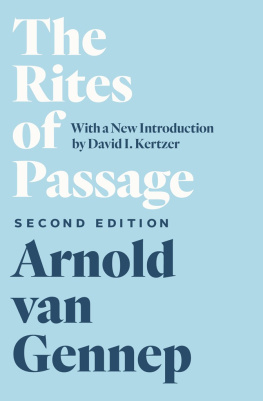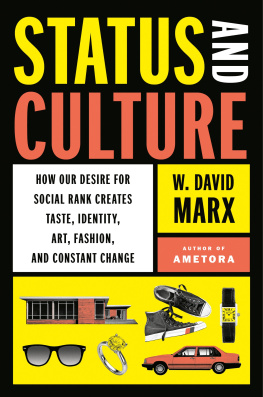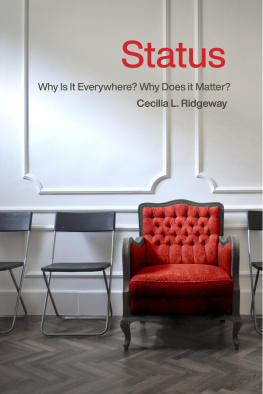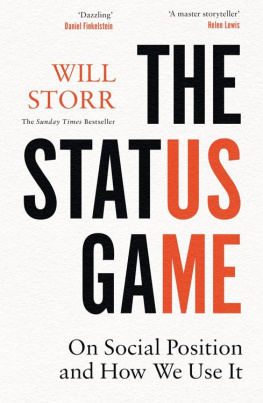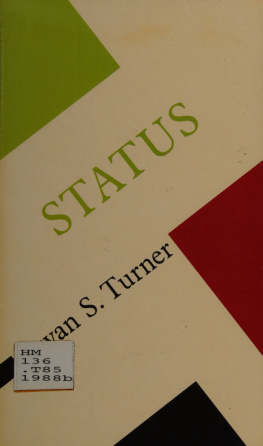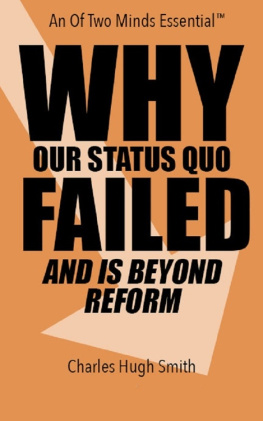Status
Passage
Status
Passage
Barney G. Glaser
Anselm L. Strauss

First published 1971 by Transaction Publishers
Published 2017 by Routledge
2 Park Square, Milton Park, Abingdon, Oxon OX14 4RN
711 Third Avenue, New York, NY 10017, USA
Routledge is an imprint of the Taylor & Francis Group, an informa business
Copyright 1971 by Barney G. Glaser and Anselm L. Strauss.
All rights reserved. No part of this book may be reprinted or reproduced or utilised in any form or by any electronic, mechanical, or other means, now known or hereafter invented, including photocopying and recording, or in any information storage or retrieval system, without permission in writing from the publishers.
Notice:
Product or corporate names may be trademarks or registered trademarks, and are used only for identification and explanation without intent to infringe.
Library of Congress Catalog Number: 2009036901
Library of Congress Cataloging-in-Publication Data
Glaser, Barney G.
Status passage / Barney G. Glaser and Anselm L. Strauss.
p. cm.
Includes bibliographical references and index.
ISBN 978-0-202-36338-7
1. Social status. 2. Social status--United States. I. Strauss, Anselm L. II. Title.
HM821.G55 2009
305--dc22
2009036901
ISBN 13: 978-0-202-36338-7 (pbk)
Preface
THOSE of our readers who are acquainted with The Discovery of Grounded Theory will remember the distinctions made there between substantive and formal theory and our assertion that social scientists develop substantive theory with relative ease compared to their generation of grounded (nonspeculative) formal theory. We remarked on the suspicion toward more general theories entertained by many social scientists, certainly by sociologistsafter three decades of Parsons and other logico-deductive theoristsand we noted the propensity of many to settle for less general theories. In that earlier book, we outlined a means for generating formal theories through comparative analyses of multiple substantive areas. At the time, we had developed no such theories; we only had some notions about how they might be generated through theoretical sampling and their comparative analysis.
Our aims in publishing the present volume are twofold. First, we present the results of an attempt to develop a formal theory about status passages, hoping that however deficient readers may find the product they will be sufficiently stimulated by it to improve our methods. Had we known of similar ventures using the same means, then of course we should not have had the temerity to advertise them as worthy of emulation. Our second more pragmatic aim is to generate formal theory that is potentially useful for studying status passages, wherever they may occur. We chose to theorize about status passages because of a long standing interest in this fascinating social phenomenon and because this universal phenomenon of passage through statuses is so deserving of a formal theory.
While our writing in this book is at a fairly abstract level, we think that even the layman who is willing to follow the development of the theory, point by point, may profit in his understanding of society and possibly even in the management of his own life. We would like to believe that professionals (in fields such as social work, gerontology, nursing, delinquency) as well as social scientists concerned with matters such as socialization, work, leisure, mobility and organizations, might gain something from our theory.
We wish to express thanks, for their useful criticism and suggestions, to three readers of the original manuscript: Rue Bucher and Joanne Stelling of the Department of Psychiatry, College of Medicine, University of Illinois, Chicago Circle; and Norman Denzin of the Department of Sociology, University of California, Berkeley. And as usual, we are grateful to the indispensable Mrs. Elaine McLarin and to Mrs. Shelia Krasow for converting scribbling and messy typing into clear type script and for meeting all those inevitable deadlines that dog most authors.
Barney G. Glaser and Anselm L. Strauss, The Discovery of Grounded Theory, (Chicago: Aldine Publishing Co., 1967). By substantive theory we mean that theory developed for a substantative or empirical area of sociological inquiry, such as patient care, race relations, professional education, delinquency, or financial organizations. By formal theory we mean that theory developed for a formal or conceptual area of sociological inquiry, such as stigma, deviant behavior, socialization, status congruency, authority and power, reward systems, or oganizational careers.
1. STATUS PASSAGES AND THEIR PROPERTIES
THE PHENOMENA of status passages Sociologists have also expended considerable effort studying status passages that occur within occupations (careers and socialization, for instance) and within organizations (mobility, for instance). Such passages may entail movement into a different part of a social structure; or a loss or gain of privilege, influence, or power, and a changed identity and sense of self, as well as changed behavior.
One of the hallmarks of status passages, especially ones deemed important by passagees or other interested parties, is the astonishingly frequent and free discussion of passages, for these are open rather than tabooed topics. Their very existence points to vital personal and social concernsas reflected by van Genneps initial choice of examined passagesor at least quite absorbing interests. The talk itself is an immensely varied provider of properties of status passage. It may, for example in recruiting, be directed at a potential passagee, to describe or advise him about his future steps. The recruiter may idealize the passage for the passagee to persuade him to embark on the passage if he either seems reluctant to begin the passage or wishes to withdraw after an initial trial in it. The recruiter may also dissuade him from attempting it. The passagee also talks in a variety of modes about his impending passage, and to whom he talks and in what characteristic mode is likely to be socially patterned. Agents in his future passage also talk about him, to each other and to him, in patterned ways.
Passages themselves are continually discussed by participants. They may receive both general support and redefinition, either in part (some of the steps or division of labor among agents should perhaps be changed) or virtually en toto. Because status passages frequently are associated with the functioning of organizations and institutions, public debate about passages is very likely to be prominent in any discussion about organizational or institutional change, including that which has already occurred or should occur or expectably will occur.
No wonder, then, that social scientists have been interested in status passages and have found them relatively easy to research, whether they are isolated for special study or examined as segments of a larger social context. Indeed, we would argue on two grounds that status passages deserve a great deal more study. Insofar as every social structure requires manpower, men are recruited by agents to move along through social positions or statuses. Status is a resting place for individuals. But while the status itself may persist, for many years, no matter how long an individual remains in, say, an office, there is an implicit or even explicit date when he must leave it. The following statement applies to most: A temporal dimension is implicit in all kinds of status. No one is assigned, nor may he assume, a position or status forever. Always there is a clause, whether hidden or openly acknowledged, whereby a man may be dispossessed or may dispossess himself of the status. For the potentially profitable purposes of research, the social scientists has only to look at a person and ask, What passages is he going through today?" or look at an event while asking, What passage is occurring, and who is playing what roles in it?



